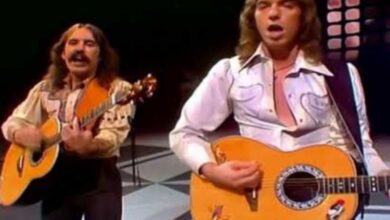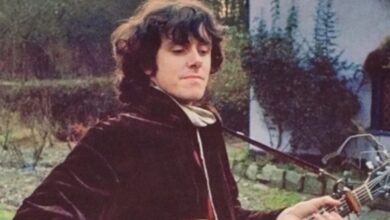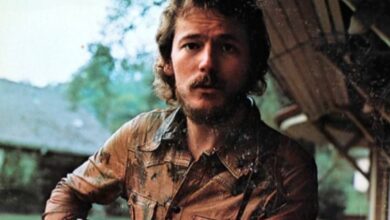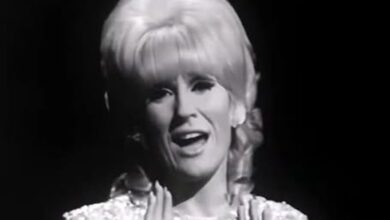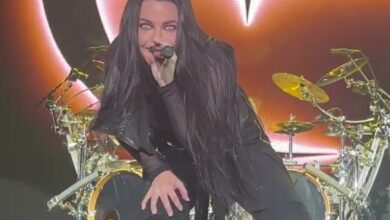KISS – “Parasite” Live at Winterland 1975: The Night Ace Frehley’s Riff Ignited an Entire Era
The Winterland Ballroom in San Francisco had a reputation for turning ordinary nights into mythology, and on January 31, 1975, KISS walked in ready to carve their own legend into its walls. Under Bill Graham’s stewardship, the venue had become a proving ground for bands on the verge of ignition, and KISS—caught between their gritty bar-band origins and their looming rise to arena dominance—attacked the stage like contenders entering a championship ring. Chrome reflected the spotlights, their makeup flared beneath camera lenses, and the room seemed to contract around four figures who appeared far too large for the stage that tried to hold them. The audience didn’t just watch; they leaned forward, pulled toward the spark as though it might leap from stage to balcony at any moment.
Context is everything with KISS, and when they stormed Winterland in 1975, Hotter Than Hell was still a fresh ember in their discography. They were in the process of converting curiosity into allegiance—turning doubters into disciples through volume, speed, and a level of precision that felt almost militaristic. What unfolded that night resembled a thesis defense for their early work: a string of songs engineered for combustion, delivered with the kind of intensity that transforms a venue into a rumor factory. Years before a live album would immortalize their showmanship, Winterland offered a rare, uncluttered glimpse of their early formula—tight, theatrical, hungry, and fully intent on proving something.
The reconstructed setlist—pieced together by collectors and reinforced by circulating footage—shows the band in full acceleration. You can chart the momentum from song to song: the early jolts, the smoke curling upward, the perfectly judged pacing, and the ramp toward larger-than-life moments that gave each musician room to break into a sprint. Positioned strategically within the arc was “Parasite,” serving as a steel beam supporting the show’s entire structure. Those who only know the studio recording discover something crucial here: live, the track sheds nostalgia entirely and becomes an attack—leaner, sharper, and heavier, as if the riff had spent a year waiting for a room large enough to shake.
“Parasite” bears Ace Frehley’s unmistakable imprint, even though Gene Simmons voiced the original 1974 studio version on Hotter Than Hell. It was always one of the record’s toughest tunes—a streetwise riff disguised as a hook, equal parts grit and menace. Critics later labeled it proto-metal, even proto-punk, the sound of warm tubes and alleyway grit. At Winterland, the track keeps its grime but gains altitude; it rises faster, lands harder, and feels propelled by the room itself, as though the venue had become an unseen fifth band member pushing the song forward.
The defining feature of the Winterland version is the pocket—an urgent forward lean that tightens the groove without choking it. Peter Criss pushes the tempo like a driver catching every green light; Simmons anchors the floor with a low-end thrum that feels bolted in place; Stanley slices through the rhythm with off-beat accents that feel like flashes of steel; and Ace lifts the whole structure with a tone that is equal parts molten and precise. The simplest praise applies: they play like a single organism. In that setting, “Parasite” becomes more than a track—it becomes an invitation to hang on and not glance down.
Ace’s guitar is the magnetic center of the performance. He was never a shredder in the later ’80s sense; he was a stylist, a craftsman of melodic attitude, someone who understood that the right vibrato on a short phrase could tilt an entire balcony toward the stage. At Winterland he threads those phrases into “Parasite” with a fighter’s efficiency—jab, dodge, smirk, repeat—letting his bends linger just long enough to suggest the next blow. If the measure is influence rather than speed, this is the kind of playing that plants flags in countless future garages and bedrooms. It’s swagger refined into inevitability.
The cameras add their own layer to the mythology. Even in the surviving reels—some cleaned up, some re-colored—you see a band that already knew how to choreograph chaos. Every move reads like a still frame waiting to be captured: Gene lifting his bass like an executioner’s weapon; Paul arranging his stance around a microphone with geometric precision; Ace tipping toward his fretboard with cigarette-cool detachment; Peter squaring his shoulders as if daring the drum kit to keep up. None of this is improvised; it’s a visual dialect. Winterland didn’t just film a show—it filmed a band teaching the world how to watch them.
The venue itself acted like a co-instrument. Winterland’s wood, height, and natural resonance gave the percussion a spring, let the guitars swell outward, and wrapped the vocals in a faint glow that modern live recordings still struggle to simulate. When “Parasite” reaches full throttle, you can hear the room answer in real time: the snare ricocheting into the rafters, the higher guitar frequencies catching on reflective surfaces, and the murmur of the crowd compressing into a warm hiss between lines. It’s the perfect fusion of acoustics, electricity, and urgency.
The camera work ensured that the performance would keep breathing long after the last stomp shook the floorboards. Fans traded tapes, swapped upgrades, and eventually uploaded restorations so crisp you can spot reflections in a tuning peg. What remains is more than archival trivia—it’s a moving testament to a band learning to generate its own gravitational force. And whenever an even cleaner cut emerges, new listeners reach the same realization the crowd reached in 1975: “Parasite” isn’t a deep cut; it’s foundational.
The song’s journey through KISS history also adds texture. It tore through the Hotter Than Hell tour, vanished from setlists for long stretches, then roared back decades later with renewed ferocity. That evolution highlights its dual nature: rooted in its time yet evergreen. Watching the Winterland footage, you understand instantly why the band could shelve it and revive it without losing potency. The riff is a machine built for perpetual motion; the performance is the accelerant.
The crowd deserves its own footnote in the story. They look like the earliest generation of true converts. Some arrived for spectacle, their faces lit by flash pots; others for the physical weight of the sound; a few simply for the thrill of being close to something unpredictable. When “Parasite” locks into its groove, the camera catches a look that says everything—half grin, half flinch—a reaction that only escapes when a band hovers just above the edge of control. It’s the expression of a city expecting to be impressed and a band fully prepared to deliver.
What KISS accomplished at Winterland went beyond sheer loudness. It was an architecture of momentum—the art of sculpting a set that rises like a skyline and then funnels all attention into a single window. “Parasite” becomes that focal point. The band doesn’t merely play it; they inhabit it, each part locking into another with the certainty of steel joining steel. That structural inevitability transforms the moment into a memory, even for those who never stepped foot in the room.
Revisiting the footage after Ace Frehley’s passing at 74 brings a mixture of exhilaration and ache. You watch his hands—sure, inventive, mischievous—and hear a tone that still feels like a streetlight flickering awake at dusk. The headlines capture the facts; the footage captures the reason behind them. Here is Ace at the height of his instinctive brilliance, the musician whose riff became a rallying banner and whose bends made entire crowds inhale at the same moment. This isn’t nostalgia—it’s documentation.
His loss casts Winterland in a new light. The tight shots of his fretwork feel like postcards from a city you always meant to visit more often. You begin to notice the tiny details—the subtle left-hand quiver at the end of a sustained note, the way he sets up a phrase by stepping into the microphone’s shadow—that once escaped your eye. Grief has a way of sharpening perception; here, it also deepens appreciation. We didn’t just lose a guitarist—we lost an architect of attitude.
If someone asked for a single clip to explain why “Parasite” remains a touchstone for musicians and critics fifty years on, Winterland would be the obvious answer. It’s heavy without excess, quick without haste, memorable without compromise. It sounds like a band that has already written its destiny on a backstage mirror and is now underlining it in thick strokes. Legends aren’t born complete; they’re forged on nights like this, in rooms that know how to echo history.
Ultimately, the performance stands apart not merely for its force or its place in the timeline, but for its sense of arrival. KISS entered Winterland as challengers and exited as inevitabilities. “Parasite” was the giveaway—the proof that a song could be both a blade and an embrace. Watch it once for its riffs; again for the staging; a third time just to catch Ace grinning after a line lands exactly where he aimed it. That grin is the sound of a band—and a guitarist—staking their claim.
And so the footage keeps circulating, upgraded and rediscovered, a stream of firelit riffs and gleaming chrome that travels from a cold night in 1975 to screens around the world. The music carries the message: this is what it felt like when four New Yorkers stamped their initials into the rafters. With Ace gone, that message settles with the weight of a final chord, ringing slightly longer than expected—long enough to smile, nod, and press play once more.
